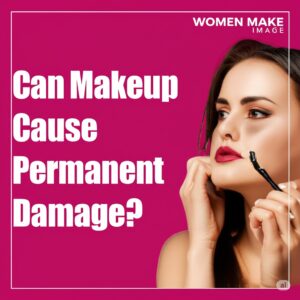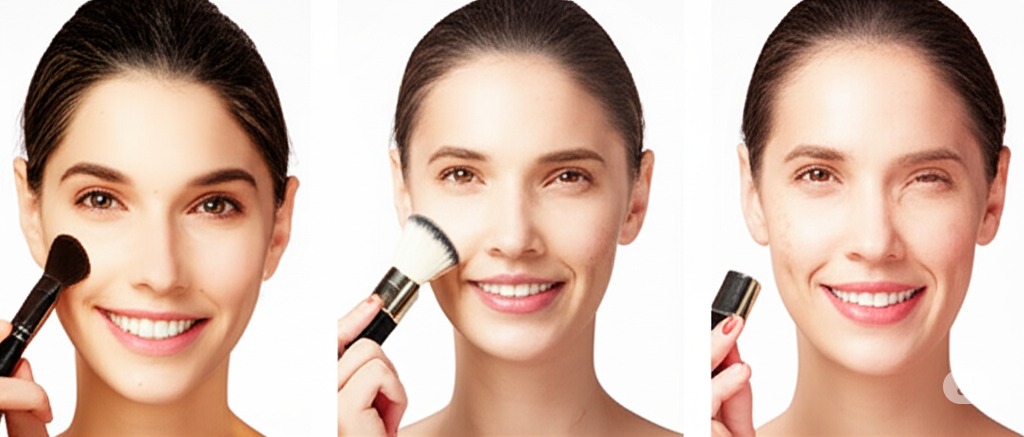Makeup is more than just powder and pigment—it’s art, it’s empowerment, and for many, it’s part of everyday life. Whether you dab on a little concealer or go full glam, there’s no denying makeup’s transformative magic. But beneath the beauty lies a serious concern: Does makeup damage skin permanently?
This article dives deep into the world of cosmetics and skincare to uncover the truth. Spoiler alert—it’s not all bad news, but it’s a wake-up call for those who sleep in foundation and skip the double cleanse.
What Is in Your Makeup?
Before we get into damage control, let’s talk about what we’re putting on our faces.
Common Ingredients Found in Cosmetics
Most makeup products contain:
Preservatives like parabens and formaldehyde-releasing agents
Fragrances that can trigger allergies
Pigments and dyes, both natural and synthetic
Silicones and binders to keep products smooth and long-lasting
Natural vs. Synthetic: Is One Safer?
Not necessarily. “Natural” doesn’t always mean safe, and synthetic doesn’t always mean toxic. Some natural ingredients like citrus oils or essential oils, can irritate sensitive skin, while well-formulated synthetics may be perfectly skin-friendly.
How Makeup Interacts With the Skin
Your skin isn’t just a blank canvas—it’s a living, breathing organ. So, how does makeup affect it?
Absorption and Surface Build-Up
While most makeup sits on the skin’s surface, small particles—especially in creams and liquids—can penetrate pores and alter oil production.
Disrupting the Skin Barrier
Frequent use of heavy products may wear down the protective outer layer, leading to:
Dehydration
Irritation
Sensitivity
Is Daily Makeup Use Safe?
The good news: wearing makeup daily doesn’t automatically doom your skin.
What Dermatologists Say
Dermatologists often agree that high-quality, non-comedogenic makeup used with proper skincare is generally safe—even daily.
The Real Enemy: Poor Habits
What causes issues is:
Sleeping with makeup on
Using expired or contaminated products
Never washing brushes or sponges
Can Makeup Cause Permanent Damage?
Short-Term vs. Long-Term Effects
Short-term irritation is common, but long-term or permanent damage typically results from:
Chronic inflammation
Deep cystic acne and scarring
Pigment disorders
Collagen breakdown from UV or toxin exposure
Sensitization and Allergic Reactions
Over time, the skin can become sensitized to certain ingredients. This can lead to permanent allergies, where even minimal exposure causes flare-ups.

Realistic Examples of Skin Damage
Let’s look at a few real-world scenarios
Maria, 65: Heavy foundation user for 40 years, now dealing with rough texture and deep pores.
Ayesha, 28: Developed hyperpigmentation from reaction to fragrance in blush.
Helen, 47: Never removed eye makeup properly—now suffers from milia and chronic puffiness.
These aren’t myths. They’re cautionary tales.
Makeup and Skin Conditions
Makeup and Acne-Prone Skin
Heavy foundations can clog pores, trap bacteria, and lead to cystic breakouts. Powder-based products may help minimize this risk.
Rosacea, Eczema, and Sensitive Skin
Even “gentle” makeup may trigger flare-ups. Look for products with no:
Alcohols
Fragrance
Menthol
Dyes
Does Makeup Age the Skin?
Free Radicals and Oxidation
Some ingredients—especially when exposed to sunlight—can create free radicals that damage collagen and elastin.
Skipping SPF While Wearing Makeup
Makeup isn’t enough to protect from UV rays. Without sunscreen, damage can accumulate and age the skin faster.
The Role of Skin Prep and Cleansing
Applying makeup on dry, unmoisturized skin? Big no-no.
Layering Is Loving
Always prep with:
Moisturizer
Primer (optional)
SPF
Proper Removal
Use:
Oil-based cleansers or micellar water
Gentle second cleanse
Exfoliate 1–2 times per week
Non-Comedogenic and Dermatologist-Tested: Do They Matter?
Understanding Labels
Non-comedogenic: Less likely to clog pores
Dermatologist-tested: Vague and not FDA-regulated
Fragrance-free: Better for sensitive skin
Not all labels are created equal. Always check the ingredient list, not just the buzzwords.
Psychological Impact of Makeup on Skin Health
Makeup can boost confidence—but when it turns into a mask, it becomes a crutch.
The Emotional Side of Overuse
Excessive use driven by insecurity can:
Lead to stress-related breakouts
Prevent users from seeking real skin treatments
Mask symptoms of skin disease
Clean Beauty and Skin-Friendly Alternatives
The rise of clean beauty is a step forward, but be cautious.
Trends That Help
No parabens or sulfates
Transparent ingredient lists
Eco-conscious and cruelty-free
Still, “natural” isn’t automatically “non-irritating.”
Safe Makeup Practices to Protect Your Skin
Simple Habits, Big Results
Wash brushes weekly
Avoid pumping air into mascara (it breeds bacteria)
Discard expired items (especially liquids)
Patch Test New Products
Always test on the jawline or inside of your arm first.
Makeup for Aging Skin
Mature skin has its own rules.
What to Avoid
Heavy powders (settle into fine lines)
Shimmer on textured skin
Matte lipsticks (drying)
What Helps
Cream blushes
Dewy foundations
Hydrating primers

What Dermatologists and Experts Say
Skin experts agree: Makeup in itself isn’t harmful—it’s how we use it.
“Permanent damage from makeup is rare but possible with repeated misuse,” says Dr. Samantha Young, a dermatologist.
“Choose products with skin-benefiting ingredients. Treat your makeup like skincare,” advises esthetician Jenna Claire.
Conclusion
Does makeup damage skin permanently? It can—but only if used improperly or carelessly over time. Smart, informed use paired with great skincare lets makeup and skin coexist beautifully. Love your look, but love your skin more.
FAQs
1. Can wearing makeup every day ruin my skin?
Not if you’re using quality products, removing them properly, and taking care of your skin underneath.
2. Is it bad to sleep with makeup on once in a while?
One night won’t destroy your skin, but repeated neglect will lead to clogged pores, dullness, and long-term issues.
3. Are natural or organic makeup products always better?
Not always. Some natural ingredients are more irritating than synthetic ones. Always check for allergens.
4. Does makeup cause wrinkles?
Not directly, but poor habits (like tugging during application or skipping SPF) can speed up aging signs.
5. What’s the best way to remove makeup completely?
Use a two-step method: oil-based remover followed by a gentle cleanser. Don’t forget your hairline and under the jaw! Does Makeup Damage Skin Permanently

